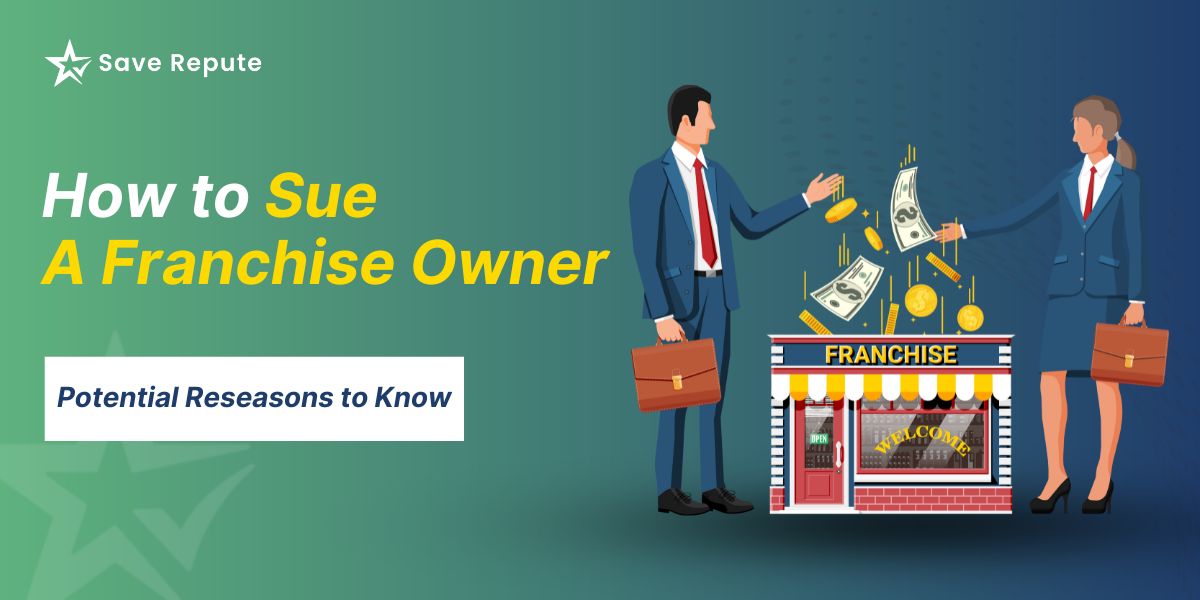Most of the times when a customer goes to a franchisee he thinks that they will provide the same quality product and services as the franchisor does. But that’s not always the case, some of the time franchisees fail to provide quality services and customers get disappointed or somehow they face a dispute among them.
But beside this, can you sue a franchise owner? There are several reasons for this such as breach of contract, misrepresentation and others. But can you sue a franchise owner the answer is yes, you can but not directly. There are some rules and regulations you need to follow.
Want to know how to sue a franchise owner? In this blog post, we’ll provide you some steps to sue the franchise owner, and provide you tips on how professional services can help in repairing a bad reputation of a franchisee.
Table of Contents
Can a Customer Sue a Franchise Owner?

Certainly, a franchise owner can be sued by a customer. Nevertheless, the way is more difficult than it would be for a normal business; this is because in most instances, the franchise owner does not control what their individual franchisees do.
To sue a franchisor, the customer must first establish if he or she has valid claims against the particular franchisee who served him or her with substandard services or products. It follows that they also have to find out whether they can take legal action against the head company as per the terms of agreement.
Who is Liable for Losses in a Franchise?
Franchises operate under a shared franchise responsibilities between the head company and sub branches. It means that both parties can be held liable for the loss.
Now a question can be headed towards your mind Can a franchise owner be fired? Yes, he can. If a customer is looking for compensation for their loss. It’s up to them who they want to sue for their negative experience, either franchisee or head company.
What are the Reasons to Sue a Franchise Owner?

Here are some of the reasons to sue a franchise owner:
- Breach of Contract: A franchisee may be sued if he or she fails to comply with their duties as stated in the agreement for the franchise.
- Negligence: Businesses can sue a franchisor for negligence that causes injury or damage to clients.
- Fraud: Clients have recourse against a franchisor who practices deceitful means or propagates false information.
- Product Liability: These defective products, when sold by the franchisor, make them liable under product liability law.
- Employment Disputes: The franchise owner may be taken to court over labor related matters and other employee rights issues.
- Intellectual Property Infringement: The act of using another company’s intellectual property without any authorization entitles the owner of that IP to file infringement charges against such franchises.
- Lease Disputes: Breaking lease agreements with landlords may lead to litigation.
- Discrimination: If a person has been discriminated against by race, gender, religion, or other protected characteristics from working in a place, one would bring about legal action against such acts committed by an employer-it could form a basis of litigation.
How to Sue a Franchise Owner?

If your sentiments have been harmed by a franchisee or franchise owner, then you may have grounds for a lawsuit. Here are some steps that you can take if you consider legal action necessary.
-
Understanding Areas of Liability
Before suing, make sure to understand the potential areas of liabilities. The franchise owners can be held accountable for employment disputes, intellectual property, product liability, discrimination, intellectual property infringement, and lease disputes.
-
Gather Evidence
If you want your franchise case law to stand strong, then you should collect strong evidence that supports your claim powerfully. This evidence can be in any form; you can attach photos, documents, witness statements, and any other relevant information.
-
Seek Legal Advice
It is highly recommended to consult with a franchise lawyer who specializes in franchise law before taking any legal action. They can advise you on the best course of action and help you understand the legal process.
-
Consider Alternative Dispute Resolution
Instead of going straight to a lawsuit, consider alternative methods of resolving the issue, such as mediation or arbitration. These can be less expensive and time-consuming than a full-blown court case.
-
File a Complaint
If your dispute involves issues such as discrimination or employment disputes, you may need to file a complaint with the Equal Employment Opportunity Commission (EEOC) or other relevant agencies.
-
Prepare For Litigation
If all else fails and legal action is necessary, make sure you are well-prepared for the litigation process. This includes gathering evidence, hiring a franchising lawyer, and understanding your rights as a plaintiff.
What is a Lawsuit Against a Franchisor?

A lawsuit against a franchisor is a type of legal action brought by a franchisee (the person or entity who purchases the rights to operate a franchise business) against the franchisor (the company that grants the franchise). This may be due to various issues such as franchisor breach of contract, fraud, misrepresentation, discrimination, or unfair business practices. The specific details and allegations of the lawsuit will vary depending on the circumstances of each case.
Such lawsuits can be complex and can have a significant impact on both the franchisee and the franchisor. The outcome of these legal actions can result in financial damages, termination of the franchise agreement, or even the closure of the business.
How Can a Franchise Owner Repair Their Bad Reputation?
Franchise owners can easily repair their bad reputation by contacting or getting quotes from a reputable online reputation management company. He or she can search online for their specific query, make sure you select a company that is professional in their operation and has years of experience.
You can read their online reviews on Google or other resources or you can ask your close relatives or friends if they have had such an experience. Make sure to select an organization that is nearby your area, to avoid additional cost.
Conclusion
While franchising can provide entrepreneurial opportunities and potential for success, it is not without its risks. Franchisees should thoroughly research and understand the terms of the franchise agreement before signing, and continuously communicate with the franchisor to ensure a successful partnership.
In case of any disputes or legal issues, seeking professional advice from a lawyer experienced in franchise law is highly recommended. By being informed and proactive, both franchisees and franchisors can mitigate risks and work towards building a mutually beneficial relationship.


